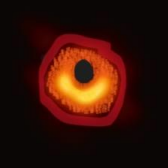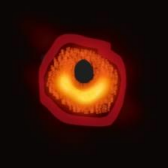Black Holes

On a fine morning, my brother was drawing black holes. I took my opportunity to search for this on the internet as my mind was filled with curiosity. I had been thinking black holes were just holes that were black and were floating and swaying around the open galaxy far from us. I researched a lot about it and found out that black holes are astronomical objects that have experienced gravitational collapse and left behind spheroidal regions of space from which nothing, including light, can escape. There is no way to bring light back from beyond the event horizon, which is the point at which light is irreversibly lost to gravity. With his general theory of relativity, Albert Einstein predicted the existence of black holes in 1916. Many years later, in 1967, American astronomer John Wheeler came up with the term “Black Hole”.
It was a fine Friday morning in the month of March 2021. I was at home in Malé, Maldives. As usual, I was doing one of my favourite things, poetry, and my brother was on the computer researching some things as a hobby.
A few minutes later, I saw him drawing holes with a black marker. He often drew things from the internet, but I couldn’t figure out what he was drawing until I looked over some images on the internet. He was drawing black holes from the galaxy.

Black holes are astronomical objects that have experienced gravitational collapse and left behind Spheroidal regions of space from which nothing, including light, can escape. They occur as a result of gravity's influence on how light waves move through space.
With his general theory of relativity, Albert Einstein predicted the existence of black holes in 1916. Many years later, in 1967, American astronomer John Wheeler invented the term "black hole".
The demise of a big star can result in the formation of a black hole. The core of a big star becomes unstable and collapses in on itself at the end of its life, and the star's outer layers are blown away. The dying star is compressed to the point of zero volume, and an infinite density is termed singularity by the crushing weight of constituent matter falling in from all directions.
Due to the fact that black holes are called black holes, we tend to imagine black holes as black spheres in the middle of space, so don't let the name fool you. The truth is not all black holes fit this description because light can still be omitted from the region outside the event horizon. It's a relief to know that black holes don't suck everything in, so don't worry! They're not going to consume everything in the universe eventually.
Did you know that there are three categories of black holes or that the first black hole wasn't discovered until X-ray Astronomy was used? A black hole is a region of space in which gravity is so strong that even light cannot escape.
Because stuff has been crammed into such a small space, gravity is potentially powerful. The very nature of black holes prevents them from being seen. There is no way to bring light back from beyond the event horizon, which is the point at which light is irreversibly lost to gravity. Only by observing their impact on light and other objects do we know they exist.
References:
https://iopscience.iop.org/article/10.1088/0264-9381/30/23/235007/meta
https://en.wikipedia.org/wiki/Black_hole
https://worldwidescience.org/topicpages/b/black+hole+universe.html
https://www.britannica.com/story/how-do-black-holes-really-work
https://www.science.org.au/curious/space-time/black-holes
Author biography
13-year-old Aishath Rym Abdul Rasheed is a student at Jamaluddin school,
Male’, the Maldives. She currently attends the prestigious Leaders of Tomorrow program by the Ugail Foundation, where she has gathered a diverse range of interests. Poetry, science, history, and psychology are a few examples of such interests. Rym can be seen as very active and attentive in school events, competitions and activities. Whether it be speaking, dancing, singing or anything else, she adores participating in school award ceremonies and other events. Among all of her many interests, she is particularly drawn to poetry. This year, it has expanded with all the skills she has learned from the Leaders of Tomorrow programme.

Cite this article as:
Aishath Rym Abdull Rasheed, Black holes, theCircle Composition, Volume 2, (2022). https://thecirclecomposition.org/black-holes/
